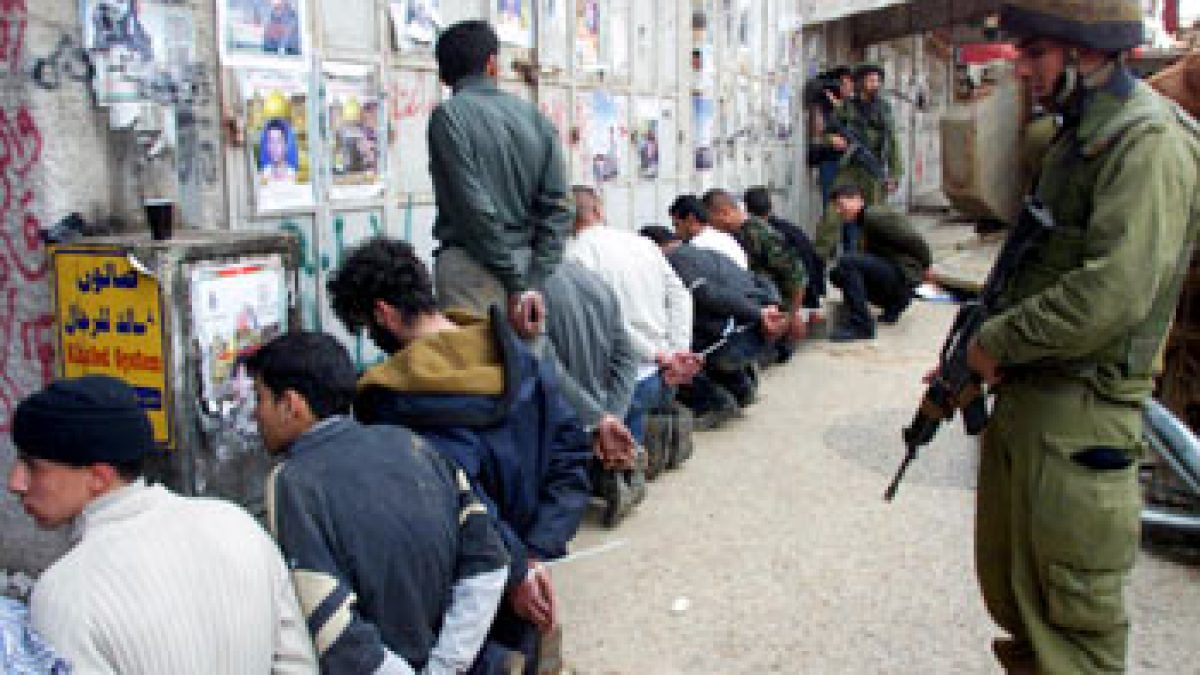An Israeli soldier watches a number of Palestinians arrested by the occupation forces in Ramallah in the West Bank (Reuters)
Palestinian prisoners suffer greatly in Israeli prisons due to the violations they are exposed to, which include starvation, torture, and sexual harassment, and some of them remain for long periods in administrative detention without being charged, according to the desire of the occupation authorities.
In an interview conducted with them by Anatolia Agency, the two jurists, Ahmed Bin Shamsi, Director of Communication and Advocacy in the Middle East and North Africa Department at Human Rights Watch, and Amina Al-Taweel, spokeswoman for the Palestine Center for Prisoner Studies, review the extent of the violations committed by the occupation against Palestinian detainees in Israeli prisons, and the laws that it has enacted. Israel is a sword hanging over the necks of the Palestinians to justify their arrest whenever it wants.
Ahmed Bin Shamsi says that Israel committed many war crimes and violated international law during its aggression against the Gaza Strip, which began on the seventh of last October, and among those violations was the imprisonment of thousands of Palestinians in its prisons.
Unjust laws
The arrest was not limited to Palestinians in Gaza, but also affected them in the West Bank and occupied Jerusalem, where the occupation threw thousands of Palestinians into prisons under the “administrative detention” and “unlawful combatant” laws.
Ben Shamsi points out that as of the end of 2023, there were 3,291 Palestinians in administrative detention in Israeli prisons from the West Bank and occupied Jerusalem. In addition, 661 Palestinians were arrested under the Unlawful Combatant Law, which allows arrest without submitting any document for 45 days, and refusal to meet or appoint a lawyer for 6 months.
The human rights activist confirmed that arrests under these two laws are based on secret information without any charges being brought against the detainees or subjecting them to trial.
Bin Shamsi estimates the number of Palestinian detainees in Israeli prisons since the beginning of the current war on the Gaza Strip to be thousands, and confirms that all arrests carried out by the occupation violate international laws.
Serious violations
He also points out that many violations have been recorded against detainees in men’s prisons such as Negev Prison, including torture, severe beatings, and starvation, as well as sexual harassment and stripping of women and girls detained in the Sharon Women’s Prison.
Ahmed Ben Shamsi said that Palestinian female detainees are stripped of their clothes in Hasharon Prison and searched in a humiliating manner. He confirmed that many female prisoners reported that the sleeping places are not suitable, and the quality and quantity of food is insufficient.
Ben Shamsi described Negev prison as one of the worst Israeli detention centers designated for Palestinian men. He said, "The Negev prison is essentially a desert prison, most of which is made up of tents. Israel has a special unit that carries out brutal raids on cells. In 2019, one of the prisoners died during those raids."
Ben Shamsi explained that numerous international reports had been prepared regarding inhumane practices in Israeli prisons, and those reports were presented to the Israeli Public Prosecution. He said that one of the reports of the United Nations Committee against Torture spoke of "very bad things happening in Israeli prisons."
He stated that lawyers collected testimonies from detainees and victims and sent them to the Israeli Attorney General.
Detainees' testimonies indicate that they were subjected to beatings and sexual humiliation, and that they also received threats to prevent them from filing any complaint about the violations they were exposed to.
"satanic practices"
As for the spokeswoman for the Palestine Center for Prisoner Studies, Amina Al-Taweel, she said that there are Palestinians who lost their lives as a result of severe beatings in the occupation prisons, and that the prisoners are tied up while naked, and subjected to severe beatings to death.
Amina Al-Taweel described the Israeli torture practices against Palestinian detainees in prisons as satanic acts.
She said, "We are not only talking about the number of Palestinian detainees, but also about the practices committed against them from the first moment of their arrest, such as severe beatings, punishment, harassment, threats of rape, photographing them completely naked, and other violations."
She continued, "Some prisoners suffer from fractures in the skull, jaws, chest, back, or spine due to torture. There are prisoners whose ears were cut off, or who were blinded by Israeli soldiers extinguishing cigarette butts in their eyes."
Amina denounced the silence of the international community and institutions concerned with human rights towards Palestinian detainees.
"stain"
Amina Al-Taweel said that what is happening is a disgrace to humanity and all institutions that claim humanity and pay lip service to human rights, especially the rights of prisoners.
The Palestinian activist asked, "Why do you call yourselves human rights and humanitarian aid institutions? If these institutions do not move to save the Palestinians, the Palestinian families, and the people of the Gaza Strip, that means that they are a disgrace to humanity."
Amina pointed out that Palestinian prisoners avoided speaking to the press after their release due to Israeli pressure, and added that if they appear on the media, this may expose them to punishment under any pretext.
Amina Al-Taweel concluded by saying, "One cannot believe what is happening in the Gaza Strip. The human mind cannot bear these atrocities. The Palestinians deserve to live with dignity and humanity. The Palestinians are doing their best to survive."
The Palestinian Prisoners' Club announced two days ago that there has been a significant increase in the number of Palestinian administrative detainees in Israeli prisons since October 7, with 3,484 detainees recorded, including children and women, indicating that the number of detainees during this period exceeds the number of detainees during the Intifada. 1987.
Source: Al Jazeera + Anatolia

